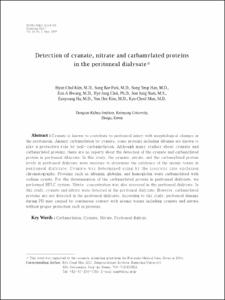Detection of cyanate, nitrate and carbamylated proteins in the peritoneal dialysate
- Keimyung Author(s)
- Kim, Hyun Chul; Park, Sung Bae; Han, Seung Yeup; Hwang, Eun Ah; Ha, Eun Young; Kim, You Hee; Mun, Kyo Cheol
- Journal Title
- Keimyung Medical Journal
- Issued Date
- 2009
- Volume
- 28
- Issue
- 1
- Keyword
- Carbamylation; Cyanate; Nitrate; Peritoneal dialysis
- Abstract
- Cyanate is known to contribute to peritoneal injury with morphological changes in the peritoneum. Against carbamylation by cyanate, some proteins including albumin are known to play a protective role by self-carbamylation. Although many studies about cyanate and carbamylated proteins, there are no reports about the detection of the cyanate and carbamylated protein in peritoneal dilaysate. In this study, the cyanate, nitrate, and the carbamylated protein levels in peritoneal dialysate were measure to determine the existence of the uremic toxins in peritoneal dialysate. Cyanate was determined using by the isocratic size exclusion
chromatography. Proteins such as albumin, globulin, and hemoglobin were carbamylated with sodium cynate. For the determination of the carbamylated protein in peritoneal dialysate, we performed HPLC system. Nitrite concentration was also assessed in the peritoneal dialysate. In this study, cyanate and nitrate were detected in the peritoneal dialysate. However, carbamylated proteins are not detected in the peritoneal dialysate. According to this study, peritoneal damage during PD may caused by continuous contact with uremic toxins including cyanate and nitrate without proper protection such as proteins.
- Publisher
- Keimyung University School of Medicine
- Citation
- Hyun Chul Kim et al. (2009). Detection of cyanate, nitrate and carbamylated proteins in the peritoneal dialysate. Keimyung Medical Journal, 28(1), 1–7.
- Type
- Article
Items in Repository are protected by copyright, with all rights reserved, unless otherwise indicated.
